24 February 2025

Yehudi Bloch, ARISE Fellow at EMBL Hamburg, talks about the snow flea antifreeze protein. This is part of a series of stories about EMBL scientists and quirky, charming proteins that make them smile.
PEOPLE & PERSPECTIVES
27 November 2023
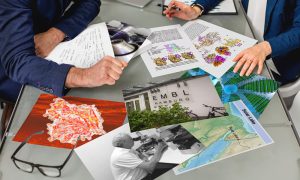
An interdisciplinary collaboration between Hamburg scientists has yielded new insights into the structure and function of a heat-resistant enzyme from an exotic microbe. In this interview, EMBL Hamburg’s Matthias Wilmanns and TUHH’s Garo Antranikian discuss how their collaboration developed and…
SCIENCE & TECHNOLOGY
2023
sciencescience-technology
1 November 2023
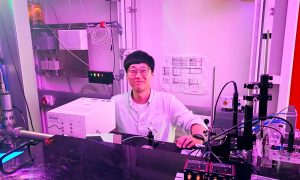
In this interview, Sihyun Sung, Postdoctoral Fellow at EMBL Hamburg, talks about making molecular movies with time-resolved serial X-ray crystallography, his sources of inspiration, and the value of forging deeper connections with friends and colleagues.
LAB MATTERSPEOPLE & PERSPECTIVES
2023
lab-matterspeople-perspectives
15 May 2023
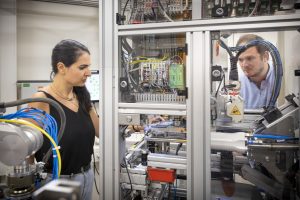
EMBL Grenoble technology teams provide a sneak peek into their latest collaborative project in structural biology services: the complete automation of an integral step in X-ray crystallography.
EMBLetc
16 February 2023
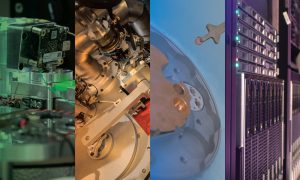
EMBL is one of the partners of this project that aims to accelerate drug discovery and development, bringing in expertise from EMBL Grenoble and EMBL-EBI.
LAB MATTERSSCIENCE & TECHNOLOGY
2023
lab-mattersscience-technology
1 December 2022
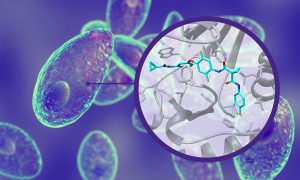
Recent studies supported by EMBL Grenoble’s expertise in structural biology research and scientific services have identified Altiratinib as a potential drug to stop toxoplasmosis infection and opened up treatment options against malaria.
SCIENCE & TECHNOLOGY
2022
sciencescience-technology
16 November 2022
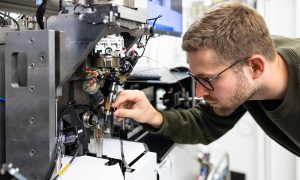
Kirill Kovalev, an EMBL Hamburg researcher, is studying the structure of an ancient bacterial molecule to help scientists control brain cell activity
EMBLetc
3 November 2022
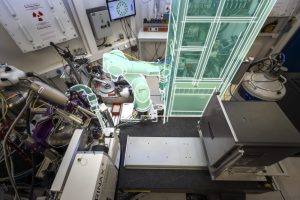
Researchers and engineers have integrated a CrystalDirect harvester into the fully automated beamline MASSIF-1, a unique combination of structural biology technologies that is now open to external academic users.
LAB MATTERSSCIENCE & TECHNOLOGY
2022
lab-mattersscience-technology
10 August 2021
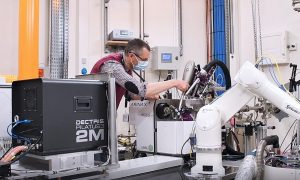
MASSIF-1, run jointly by EMBL Grenoble and the ESRF, is a beamline for macromolecular crystallography. It is used by the research community to study the 3D structure of proteins, which is important for drug development.
LAB MATTERSSCIENCE & TECHNOLOGY
2021
lab-mattersscience-technology
12 May 2021
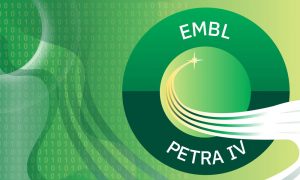
A workshop run by EMBL Hamburg explored opportunities for structural biology at the future, upgraded PETRA IV synchrotron.
SCIENCE & TECHNOLOGY
2021
eventsscience-technology
13 April 2021
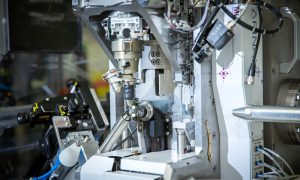
Florent Cipriani, who recently retired as Head of the Instrumentation Team after a long career at EMBL Grenoble, is one of the pioneers of instrumentation development in this field.
LAB MATTERSSCIENCE & TECHNOLOGY
2021
lab-mattersscience-technology
6 April 2021
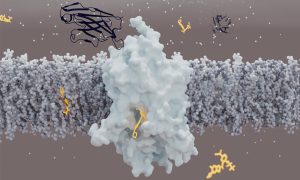
Scientists have determined the structure of Glycine Transporter 1. The finding could open new avenues for developing therapeutics for psychiatric disorders
SCIENCE & TECHNOLOGY
2021
sciencescience-technology
30 March 2021
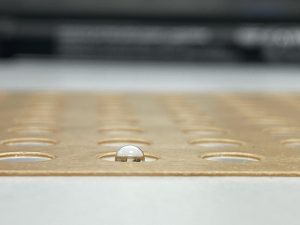
Scientists at EMBL Hamburg use droplets of protein solution to grow protein crystals. By exposing the crystals to X-rays, they are able to determine the protein’s molecular structure.
SCIENCE & TECHNOLOGY
2021
picture-of-the-weekscience-technology
25 August 2020
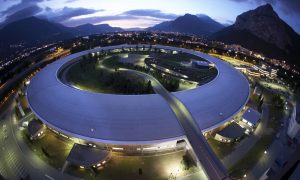
The beamlines run jointly by EMBL Grenoble and the ESRF reopen today, unveiling significant upgrades that exploit the brand new fourth generation ESRF synchrotron source.
EMBL ANNOUNCEMENTS
2020
embl-announcementsscience
17 June 2020
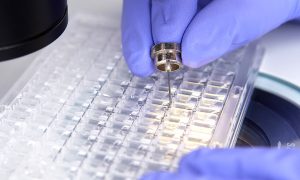
While global research on coronaviruses has shed light on the function of many SARS-CoV-2 proteins, the role of some crucial components remains unknown. Researchers at EMBL Grenoble will use a range of structural biology methods to try to solve some of the puzzles of the molecular mechanics of…
SCIENCE & TECHNOLOGY
2020
sciencescience-technology
27 May 2020
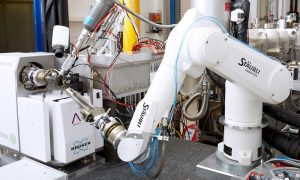
EMBL and the European Synchrotron Radiation Facility (ESRF) restart the activities of the Joint Structural Biology Group in Grenoble to support coronavirus-related projects. A new initiative will allow users to be granted access to the High-Throughput Crystallisation (HTX) lab at EMBL and to a…
CONNECTIONS
5 May 2020
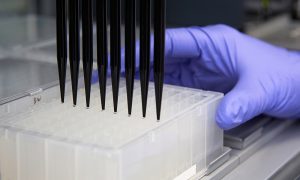
By re-opening the High-Throughput Crystallisation (HTX) lab at EMBL Grenoble, EMBL is supporting structural biology projects to respond to the health threats posed by coronaviruses.
SCIENCE & TECHNOLOGY
2020
sciencescience-technology
28 April 2020
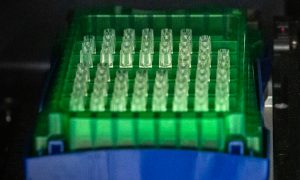
Scientists at EMBL Hamburg and Karolinska Institutet Stockholm aim to find synthetic antibodies – known as nanobodies – that bind a surface protein of the novel SARS-CoV-2 coronavirus. Nanobodies could prevent the virus from entering human cells and causing COVID-19.
SCIENCE & TECHNOLOGY
2020
sciencescience-technology
26 January 2010
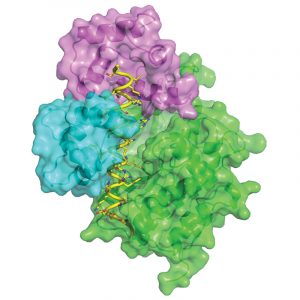
Cells rely on a range of signalling systems to communicate with each other and to control their own internal workings. Scientists from the European Molecular Biology Laboratory (EMBL) in Hamburg, Germany, have now found a way to hack into a vital communications system, raising the possibility of…
SCIENCE & TECHNOLOGY
2010
sciencescience-technology
8 November 2009
Much as adrenaline coursing through our veins drives our body’s reactions to stress, the plant hormone abscisic acid (ABA) is behind plants’ responses to stressful situations such as drought, but how it does so has been a mystery for years. Scientists at the European Molecular Biology…
SCIENCE & TECHNOLOGY
2009
sciencescience-technology
13 August 2009
Our genome is constantly under attack from things like UV light and toxins, which can damage or even break DNA strands and ultimately lead to cancer and other diseases. Scientists have known for a long time that when DNA is damaged, a key enzyme sets off a cellular ‘alarm bell’ to alert the…
SCIENCE & TECHNOLOGY
2009
sciencescience-technology
11 January 2006
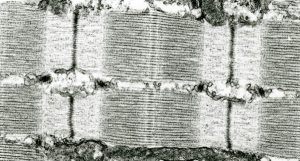
Imagine grabbing two snakes by the tail so that they can’t wriggle off in opposite directions. Scientists at the Hamburg Outstation of the European Molecular Biology Laboratory (EMBL) and collaborators from King’s College in London have now discovered that something similar happens to a…
SCIENCE & TECHNOLOGY
2006
sciencescience-technology
21 December 2005
Researchers at the International Centre for Genetic Engineering and Biotechnology (ICGEB) in India and a unit of the European Molecular Biology Laboratory (EMBL) in France have made a key discovery about a molecule that helps the malaria parasite infect human cells. India is one of the countries…
SCIENCE & TECHNOLOGY
2005
sciencescience-technology
16 November 2005
Today the European Molecular Biology Laboratory (EMBL) opens a new highthroughput crystallization facility at its Outstation located on the campus of the German Synchrotron Radiation Facility (DESY) in Hamburg, Germany. The facility, made possible by major funds from the German Ministry for Science…
EMBL ANNOUNCEMENTSLAB MATTERS
2005
embl-announcementslab-matters
No results found



















